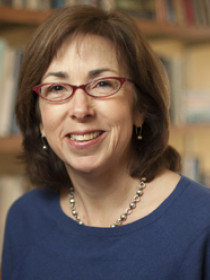Connect with Suzanne
About Suzanne
Mettler’s current research investigates how changes in U.S. social welfare and educational policies have evolved since the 1970s, in the midst of rising economic inequality, and how the changes have influenced American attitudes about government and participation in politics. In particular, she probes the impact of the proliferation of spending programs in the tax code; the changes in federal financial aid policies for college students; the weakening of other social programs; and the implementation of the new health care reform law enacted in 2010.
Contributions
How the GI Bill Built the Middle Class and Enhanced Democracy
Key Findings Brief,
Why Americans Can't See Government - And Why It Matters
Key Findings Brief,
No Jargon Podcast
In the News
"Getting By With Less and Less," Ryan LaRochelle (with ), Central Maine Today Media , January 21, 2020.
"Outside of Washington, There is a New Vital Center in Health Care Reform," Suzanne Mettler (with ), Health Affairs Blog, July 31, 2017.
"Why Public Opinion on ObamaCare Should Worry Us All," Suzanne Mettler (with ), The Hill, June 21, 2016.
Suzanne Mettler quoted on civic activism by Sam Novey, "A Present from Our 18-Year-Old Selves" Huffington Post, October 18, 2015.
Suzanne Mettler quoted on the submerged state by Bryce Covert, "We All Get ‘Free Stuff’ from the Government" New York Times, October 8, 2015.
Suzanne Mettler quoted on the submerged state by Paul Rosenberg, "Donald Trump’s Appeal Explained in Five Simple Steps" Salon, September 29, 2015.
Suzanne Mettler quoted on how social programs may perform under the current Republican Congress by Eric Patashnik, "Five Key Lessons about the Welfare State" The Washington Post, April 6, 2015.
Suzanne Mettler quoted on offering the false promise of smaller government through the tax code by Eduardo Porter, "The False Hope of a Limited Government, Built on Tax Breaks" New York Times, March 31, 2015.
Guest to discuss the unintended consequences of old policies in higher education on St. Louis Public Radio, Suzanne Mettler, March 16, 2015.
Suzanne Mettler's research on the politics of higher education discussed by , "U.S. Surpassed in Graduation Rates," The Acorn, November 1, 2014.
Suzanne Mettler's research on inequality discussed by , "B.A.s and I.O.U.s," New York Times, June 6, 2014.
"Great Unequalizer: Is Higher-Education Policy Making Inequality Worse?," Suzanne Mettler, Interview with Seth Freed Wessler, NBC News, May 16, 2014.
"How Higher Ed Contributes to Inequality," Suzanne Mettler, Interview with Dana Goldstein, The Atlantic, April 9, 2014.
"Equalizers No More: Politics Thwart Colleges' Role in Upward Mobility," Suzanne Mettler, Chronicle of Higher Education, March 3, 2014.
Publications
"Degrees of Inequality: How the Politics of Higher Education Sabotaged the American Dream" (Basic Books, 2014).
Offers an impassioned call to reform a higher education system that has come to exacerbate, rather than mitigate, socioeconomic inequality in America.
"Eliminating the Market Middle-Man: Redirecting and Expanding Support for College Students" in Reaching for a New Deal: Ambitious Governance, Economic Meltdown, and Polarized Politics in Obama's First Two Years, edited by Theda Skocpol and Lawrence R. Jacobs (Russell Sage Foundation, 2011), 105-138.
Examines how policymakers in 2009-10 achieved a twenty-year goal of terminating bank-based student lending and replacing it with direct lending, while enhanced Pell Grants and aid to community colleges fell short.
"The Submerged State: How Invisible Government Policies Undermine American Democracy " (University of Chicago Press, 2011).
Explores the proliferation of social welfare policies invisible to most citizens because they are channeled through the tax code or subsidies to private organizations. Shows the challenges inherent in efforts to reform such policies, many of which primarily advantage vested interests and the affluent Americans; and suggests strategies helping citizens form views about these policies and take action to change them. The book’s introduction was featured in Salon.com.
"American Political Development from Citizens’ Perspective: Tracking Federal Government’s Presence in Individual Lives over Time" (with ). Studies in American Political Development 21, no. 1 (2007): 110-30.
Tracks shifts in federal social policies from the mid-nineteenth century to the present. Presents average benefit rates in real terms and in terms of percentages of the U.S. population covered. Demonstrates persistence of programs for American seniors, the atrophy of direct programs for younger Americans, and the expansion of policies channeled through the tax code.
"The Transformed Welfare State and the Redistribution of Political Voice" in The Transformation of American Politics: Activist Government and the Rise of Conservatism, edited by Paul Pierson and Theda Skocpol (Princeton University Press, 2007), 191-222.
Offers a broad overview of changes in U.S. social programs since World War II, and explores the impact on attitudes about government and social spending.
"Soldiers to Citizens: The G.I. Bill and the Making of the Greatest Generation" (Oxford University Press, 2005).
Shows how the generous education and training benefits for veterans of World War II not only enlarged opportunities for socio-economic advancement, but also promoted more active civic engagement among the beneficiaries. Contrasts the “virtuous circle” between generous social provision and vibrant democracy in the post-war era to the more anemic links in recent decades.
